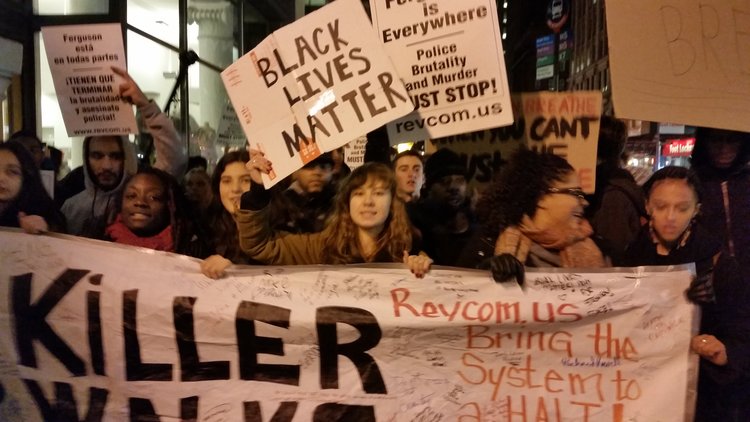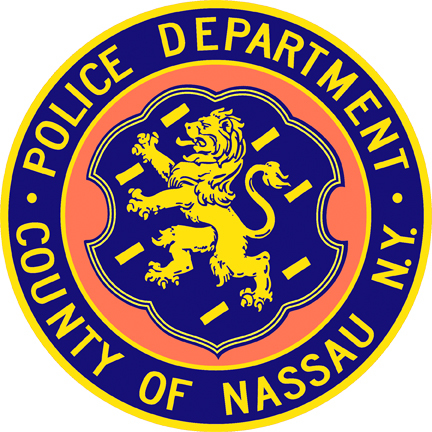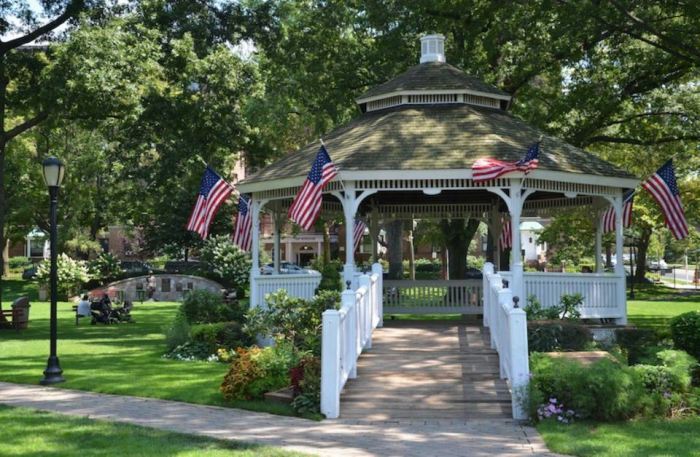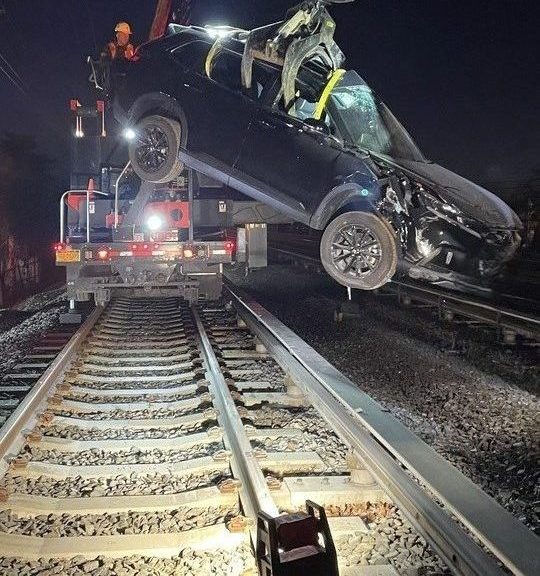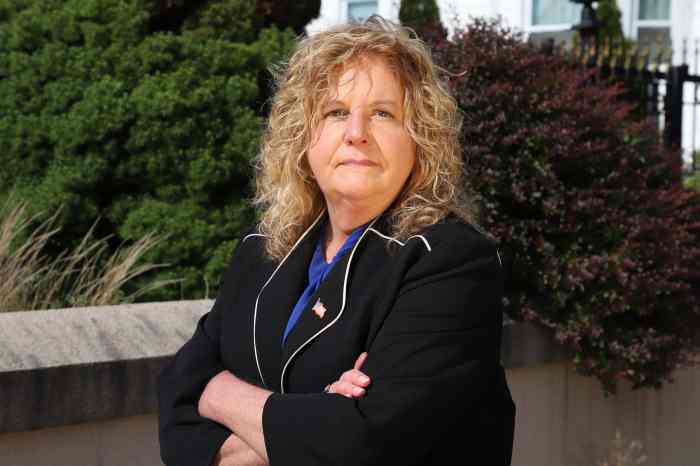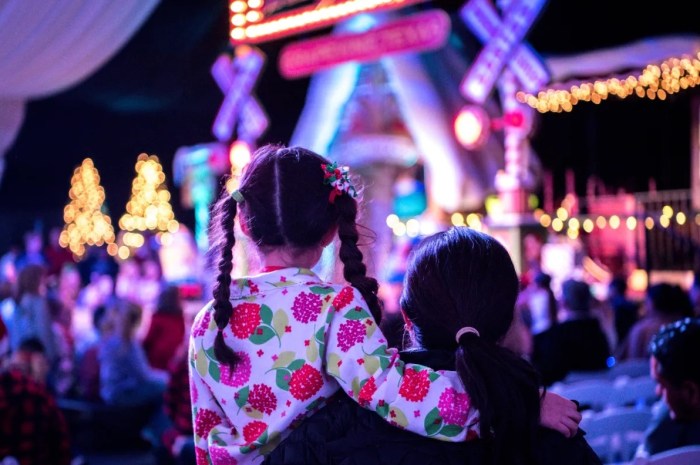Protesters were into the fourth hour of their march across New York City Thursday when their spontaneous, unplanned route brought them to the West Side Highway.
An NYPD helicopter hummed above while dozens of officers pursued on foot.
The march grinded to a halt as a human shield of officers and police vehicles barricaded the highway, shutting down traffic. At a standstill, protesters threw their hands into the chilly air, not in defeat, but in a peaceful act of defiance.
“Don’t shoot!” they taunted.
“Indict, convict, send the killer cops to jail,” they shouted. “The whole damn system is guilty as hell!”
“Fuck police brutality,” they yelled, “this is our reality!”
The grand jury indictments demonstrators had hoped for in the police chokehold death of Eric Garner and fatal shooting of Michael Brown in Ferguson, Mo. never came. So protesters said if they weren’t going to get justice, they would make as much noise as possible, and promised to disrupt the status-quo. Outraged at the decision not to indict in the Garner case, they vowed to shut down Manhattan.
Similar scenes played out in cities across the United States and throughout New York City Thursday night, one day after a Staten Island grand jury declined to indict the police officer in connection with Garner’s death. It was the second consecutive evening of citywide protests, and they were largely peaceful. Hundreds of demonstrators that had gathered in Union Square for a march to Foley Square mostly complied with police orders to stay on the sidewalk, even going to great lengths to respect police instructions to not spill into the streets, despite having to navigate narrow city blocks.
As the sea of protesters headed south, several sympathetic passersby acknowledged their cries for change by responding with symbolic gestures: a single fist raised in the air or by lifting both hands over their heads.
Once the march converged on Foley Square, where thousands were holding their own demonstrations, the number of marches seemed to multiply. With more power in numbers, the dam broke and they flooded the streets. They stalled traffic on the Brooklyn Bridge, which the NYPD had already shut down, Broadway, Canal Street and the West Side Highway.
Dozens of arrests were made across the city, mostly for refusing orders to remain on the sidewalk.
They reveled in their ability to shut down major roadways. Horns honked from sympathetic drivers behind the wheel of cars trapped in the bottleneck and protesters yelled competing chants, attracting onlookers who peered down from their apartment windows or came down to see what all the fuss was about.
Even patrons of a nearby gentleman’s club seemed to prefer the action outside.
“How do you spell racism?” protesters yelled in a call-and-response chant, “N-Y-P-D.”
They also chanted “I can’t breathe,” the phrase Garner repeated as he was taken down by four NYPD officers on July 17, one of whom put him in a deadly chokehold. The confrontation was caught on video and went viral on YouTube.
Protesters and activists who had 24 hours to digest the news of the non-indictment still expressed shock and outrage over the 23-member grand jury’s decision.
The verdict came the same day the NYPD announced a pilot body camera program at six commands across the city. In three months, additional cops will be equipped with the technology.
Monica Wright, 39, mingling on West 11th Street, questioned how videotaped recordings of police encounters would lead to any significant change since the video in Garner’s case wasn’t enough to convince the grand jury to indict the officer.
“What’s the point in recording it and having the footage if not to frankly cause more psychological damage and re-trauma over and over?” she asked. “I feel like we’re an abused nation and we’re in this violent, abusive relationship that we can’t get out of and we’re consistently being traumatized, abused and it’s like ‘We’re sorry,’ and then we’re abused again.”
Others spoke in general terms about police tactics, decrying so-called “broken-windows” policing, which focuses on low-level crimes.
Andrew Austin, 40, of Brooklyn, who was marching with the advocacy group Vocal New York near the Brooklyn Bridge told the Press he’s spent a total of 18 years behind bars for drug arrests and a robbery that he said he did not commit.
“The justice system is broken,” he said. “I’ve been through the justice system my whole life, and once you’re in, it’s a revolving door. It’s set up that way. Minorities are set up to be in it for the rest of our lives. For low-level crimes.”
“They say you’re innocent until you’re proven guilty,” he continued, “the system is designed to be guilty until you’re proven innocent.”
Austin said he was “disgusted” after hearing the grand jury decision, but his emotions changed to exhilaration upon demonstrating with thousands of others.
“It’s exhilarating, it’s exciting,” he said. “If you don’t stand up for something, you fall for anything, and it’s time that we all stood up. I’m tired.”
Standing in Union Square earlier in the evening was Joel, who didn’t want to give his last name.
Having grown up in New York, he said he’s always had to look over his shoulder.
“I want a world where my little brother doesn’t have to walk outside and be afraid that he might get shot just because of the color of his skin,” he said. “Where he can grow up and do whatever he wants and not have to worry about food or housing or anything.”
Joel also spoke in broader terms about policing and the class system.
“The police force are an expression of the capitalist system, they are the attack dogs of the ruling class,” he said. “Their actions and their non-indictment show how the ruling class feels about the working class, especially young black and Latino males.”
“Between Garner and Rodney King, they can have all the footage in the world, but they protect the structures that cause this,” he added. “The police, the military, the government, they’re all part of that same structure.”
Thursday’s protest was incredibly diverse, with young and old, blacks and whites, Latinos and Asians walking shoulder-to-shoulder.
One black male laughed as he told a person on the other end of a phone call that many of the people protesting would never be racially profiled.
Davi Cohen, 34, of Brooklyn, who is white, said the recent police killings and non-indictments affects everyone.
“This is our collective liberation that’s necessary and we are all suffering, every single person is suffering,” she said. “The effect of that suffering are very disproportionally felt in even visceral ways by different people.”
“The publicity is necessarily awakening this collective consciousness and drawing more attention to the ways in which our court system institutionalizes racism,” she added. “The non-indictments, to me, symbolize essentially a statement that it’s as if these men never died or maybe never existed in the first place, which is an atrocious statement.”
Cohen couldn’t say what kind of change these protests would bring, but she said it’s important for people to come out and have their voices heard.
“All kinds of people are questioning what is the extent to which change is possible and we don’t know what’s going to happen, but we know certainly that’s it’s important to gather,” she said, standing with several hundred protesters in Union Square. “I believe that talking, interchange, being present in what little public space that isn’t commercial space that we have, is incredibly, incredibly important.
“And that level of vulnerability and honesty, willingness to gather and giving space for all of the feelings and also the deep discontent and lack of acceptance of the status quo is a necessary part of our cultural healing and any possibility for change.”
“We hope that it could change the whole dynamic,” said Austin, the Brooklyn man. “It’s just the hope right now.”



